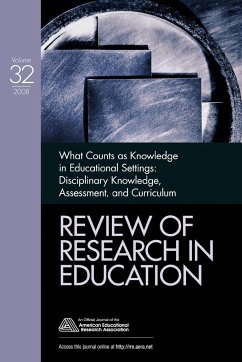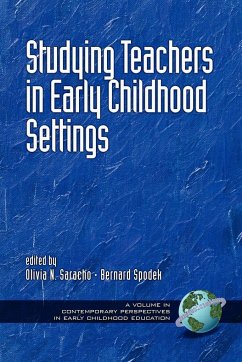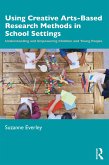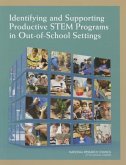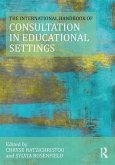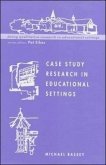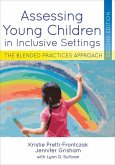Gregory J. Kelly, Allan Luke, Judith Green
What Counts as Knowledge in Educational Settings
Disciplinary Knowledge, Assessment, and Curriculum
Gregory J. Kelly, Allan Luke, Judith Green
What Counts as Knowledge in Educational Settings
Disciplinary Knowledge, Assessment, and Curriculum
- Broschiertes Buch
- Merkliste
- Auf die Merkliste
- Bewerten Bewerten
- Teilen
- Produkt teilen
- Produkterinnerung
- Produkterinnerung
This volume of Review of Research in Education provides readers with multiple interpretations of how changing views of knowledge across educational contexts shape curricular decisions, learning opportunities, and theories of teaching. The chapters situate various interpretations of knowledge in historical, political, and policy contexts and examine the relevance of these interpretations for education.
Andere Kunden interessierten sich auch für
![Studying Teachers in Early Childhood Settings (PB) Studying Teachers in Early Childhood Settings (PB)]() Studying Teachers in Early Childhood Settings (PB)62,99 €
Studying Teachers in Early Childhood Settings (PB)62,99 €![Social Justice and Culturally-Affirming Education in K-12 Settings Social Justice and Culturally-Affirming Education in K-12 Settings]() Social Justice and Culturally-Affirming Education in K-12 Settings180,99 €
Social Justice and Culturally-Affirming Education in K-12 Settings180,99 €![Using Creative Arts-Based Research Methods in School Settings Using Creative Arts-Based Research Methods in School Settings]() Suzanne EverleyUsing Creative Arts-Based Research Methods in School Settings51,99 €
Suzanne EverleyUsing Creative Arts-Based Research Methods in School Settings51,99 €![Identifying and Supporting Productive Stem Programs in Out-Of-School Settings Identifying and Supporting Productive Stem Programs in Out-Of-School Settings]() National Research CouncilIdentifying and Supporting Productive Stem Programs in Out-Of-School Settings33,99 €
National Research CouncilIdentifying and Supporting Productive Stem Programs in Out-Of-School Settings33,99 €![The International Handbook of Consultation in Educational Settings The International Handbook of Consultation in Educational Settings]() The International Handbook of Consultation in Educational Settings167,99 €
The International Handbook of Consultation in Educational Settings167,99 €![Case Study Research in Educational Settings Case Study Research in Educational Settings]() Michael BasseyCase Study Research in Educational Settings38,99 €
Michael BasseyCase Study Research in Educational Settings38,99 €![Assessing Young Children in Inclusive Settings Assessing Young Children in Inclusive Settings]() Kristie Pretti-FrontczakAssessing Young Children in Inclusive Settings49,99 €
Kristie Pretti-FrontczakAssessing Young Children in Inclusive Settings49,99 €-
-
-
This volume of Review of Research in Education provides readers with multiple interpretations of how changing views of knowledge across educational contexts shape curricular decisions, learning opportunities, and theories of teaching. The chapters situate various interpretations of knowledge in historical, political, and policy contexts and examine the relevance of these interpretations for education.
Hinweis: Dieser Artikel kann nur an eine deutsche Lieferadresse ausgeliefert werden.
Hinweis: Dieser Artikel kann nur an eine deutsche Lieferadresse ausgeliefert werden.
Produktdetails
- Produktdetails
- Verlag: Sage Publications, Inc
- Seitenzahl: 386
- Erscheinungstermin: 20. Februar 2008
- Englisch
- Abmessung: 229mm x 152mm x 21mm
- Gewicht: 558g
- ISBN-13: 9781412964333
- ISBN-10: 1412964334
- Artikelnr.: 25435060
- Herstellerkennzeichnung
- Books on Demand GmbH
- In de Tarpen 42
- 22848 Norderstedt
- info@bod.de
- 040 53433511
- Verlag: Sage Publications, Inc
- Seitenzahl: 386
- Erscheinungstermin: 20. Februar 2008
- Englisch
- Abmessung: 229mm x 152mm x 21mm
- Gewicht: 558g
- ISBN-13: 9781412964333
- ISBN-10: 1412964334
- Artikelnr.: 25435060
- Herstellerkennzeichnung
- Books on Demand GmbH
- In de Tarpen 42
- 22848 Norderstedt
- info@bod.de
- 040 53433511
Judith L. Green is Professor Emerita at the University of California, Santa Barbara. She holds a PhD from University of California, Berkeley. Dr. Green served as editor of the Handbook of Complementary Methods in Education Research (Green, Camilli, & Elmore, 2006) and of the Review of Research in Education (2006, 2008, and 2010). Her research examines how, through discourse, teachers and their students in linguistically and culturally diverse classrooms, socially construct disciplinary knowledge from preschool through higher education. She also writes on issues of epistemology related to collecting, archiving, searching, and analyzing video records within ethnographic archives. She is a fellow of the American Anthropology Association and the American Educational Research Association. She has been awarded the Lifetime Achievement Award from Division G (Social Context of Education) of the American Educational Research Association and the John J. Gumperz Lifetime Achievement Award from the Language and Social Processes Special Interest Group (AERA).
Introduction: What Counts as Disciplinary Knowledge in Educational Settings
- Gregory J. Kelly, Allan Luke, and Judith Green
From Constructivism to Realism in the Sociology of the Curriculum - Michael
Young
The Arts and Education: Knowledge Generation, Pedagogy, and the Discourse
of Learning - Vivian L. Gadsden
English Education Research and Classroom Practice: New Directions for New
Times - Melanie Sperling and Anne Dipardo
Narratives of Nation State, Historical Knowledge, and School History
Education - Bruce VanSledright
Language Moves: The Place of "Foreign" Languages in Classroom Teaching and
Learning - Diane Larsen-Freeman and Donald Freeman
Culture and Mathematics in School: Boundaries Between "Cultural" and
"Domain" Knowledge in the Mathematics Classroom and Beyond - Näilah Suad
Nasir, Victoria Hand, and Edd V. Taylor
Multimodality and Literacy in School Classrooms - Carrie Jewitt
Science Education in Three-Part Harmony: Balancing Conceptual, Epistemic,
and Social Learning Goals - Richard Duschl
Assessing English-Language Learners¿ Achievement - Richard P. Durán
Reframing Teacher Professional Learning: An Alternative Policy Approach to
Strengthening Valued Outcomes for Diverse Learners - Helen Timperly and
Adrienne Alton-Lee
- Gregory J. Kelly, Allan Luke, and Judith Green
From Constructivism to Realism in the Sociology of the Curriculum - Michael
Young
The Arts and Education: Knowledge Generation, Pedagogy, and the Discourse
of Learning - Vivian L. Gadsden
English Education Research and Classroom Practice: New Directions for New
Times - Melanie Sperling and Anne Dipardo
Narratives of Nation State, Historical Knowledge, and School History
Education - Bruce VanSledright
Language Moves: The Place of "Foreign" Languages in Classroom Teaching and
Learning - Diane Larsen-Freeman and Donald Freeman
Culture and Mathematics in School: Boundaries Between "Cultural" and
"Domain" Knowledge in the Mathematics Classroom and Beyond - Näilah Suad
Nasir, Victoria Hand, and Edd V. Taylor
Multimodality and Literacy in School Classrooms - Carrie Jewitt
Science Education in Three-Part Harmony: Balancing Conceptual, Epistemic,
and Social Learning Goals - Richard Duschl
Assessing English-Language Learners¿ Achievement - Richard P. Durán
Reframing Teacher Professional Learning: An Alternative Policy Approach to
Strengthening Valued Outcomes for Diverse Learners - Helen Timperly and
Adrienne Alton-Lee
Introduction: What Counts as Disciplinary Knowledge in Educational Settings
- Gregory J. Kelly, Allan Luke, and Judith Green
From Constructivism to Realism in the Sociology of the Curriculum - Michael
Young
The Arts and Education: Knowledge Generation, Pedagogy, and the Discourse
of Learning - Vivian L. Gadsden
English Education Research and Classroom Practice: New Directions for New
Times - Melanie Sperling and Anne Dipardo
Narratives of Nation State, Historical Knowledge, and School History
Education - Bruce VanSledright
Language Moves: The Place of "Foreign" Languages in Classroom Teaching and
Learning - Diane Larsen-Freeman and Donald Freeman
Culture and Mathematics in School: Boundaries Between "Cultural" and
"Domain" Knowledge in the Mathematics Classroom and Beyond - Näilah Suad
Nasir, Victoria Hand, and Edd V. Taylor
Multimodality and Literacy in School Classrooms - Carrie Jewitt
Science Education in Three-Part Harmony: Balancing Conceptual, Epistemic,
and Social Learning Goals - Richard Duschl
Assessing English-Language Learners¿ Achievement - Richard P. Durán
Reframing Teacher Professional Learning: An Alternative Policy Approach to
Strengthening Valued Outcomes for Diverse Learners - Helen Timperly and
Adrienne Alton-Lee
- Gregory J. Kelly, Allan Luke, and Judith Green
From Constructivism to Realism in the Sociology of the Curriculum - Michael
Young
The Arts and Education: Knowledge Generation, Pedagogy, and the Discourse
of Learning - Vivian L. Gadsden
English Education Research and Classroom Practice: New Directions for New
Times - Melanie Sperling and Anne Dipardo
Narratives of Nation State, Historical Knowledge, and School History
Education - Bruce VanSledright
Language Moves: The Place of "Foreign" Languages in Classroom Teaching and
Learning - Diane Larsen-Freeman and Donald Freeman
Culture and Mathematics in School: Boundaries Between "Cultural" and
"Domain" Knowledge in the Mathematics Classroom and Beyond - Näilah Suad
Nasir, Victoria Hand, and Edd V. Taylor
Multimodality and Literacy in School Classrooms - Carrie Jewitt
Science Education in Three-Part Harmony: Balancing Conceptual, Epistemic,
and Social Learning Goals - Richard Duschl
Assessing English-Language Learners¿ Achievement - Richard P. Durán
Reframing Teacher Professional Learning: An Alternative Policy Approach to
Strengthening Valued Outcomes for Diverse Learners - Helen Timperly and
Adrienne Alton-Lee

